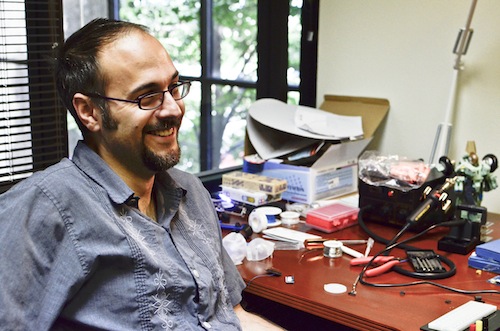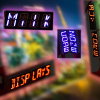Recently, Mike Hord - one of the SparkFun engineers - sat down with EEWeb to talk a little shop. They posted the interview on their website and we wanted to share some of it here. Here is part of the exchange:
How did you get into electronics/engineering and when did you start?
I came to electronics fairly late in the game. It was my senior year of high school before it occurred to me that I could make a career out of it. My high school physics teacher told us some stories about the fun stuff the electrical engineering students he knew in college had made, and that sealed the deal. That is not to say I didn’t have interest in it in the past—as a child I took apart a ridiculous number of electronic gadgets, some of which my parents would rather I hadn’t.
After high school I went on to study engineering at North Dakota State University. For me it was a great decision because of its engineering program, which is very well-respected especially in the Upper Midwest region.
What are your favorite hardware tools that you use?
My senses. I start out every troubleshooting session with four of my senses: does anything look wrong (size, shape, color), does anything feel wrong (hotter or colder than expected), does anything sound wrong (clicking, buzzing, whining), and what about smell (burning, unnatural odors)?
The best part is that setup and calibration time for these tools is zero. I always know where they are, and they’re pretty easy to use.
What are your favorite software tools that you use?
LTSpice from Linear Tech is a staple of my design work. Also, Python is great for throwing together quick tools to automate boring tasks.
What is the hardest/trickiest bug you have ever fixed?
I’ve had several involving defective component populations failing in the field. These are the worst, because that’s always the last thing you consider because it tends to be fairly unlikely, and the average engineer doesn’t have the tools to differentiate between parts failing because of a design defect and parts failing because of a component defect. Sometimes even the experts can’t find direct evidence of it and you end up having to rule out all the competing theories—that’s a very unsatisfying way to end a problem-solving arc.
You can read the rest of the article here. How would you answer some of these questions? What are your favorite hardware tools and what is the trickiest bug you've ever fixed? How did you get into electronics? We've found some of our most enlightening moments in embedded electronics aren't found in a classroom, but rather through networking with other like-minded people. Tell us your story!







Hey Mike!
You gave me a tour of the Hack Factory a year or two ago. I didn't know you were at SF, now. Congrats!
I hope you ( and Pete) can visit sometime, and bring more SF to MPLS
Mike
I also attended North Dakota State in the M.E. department. Great school for engineering!
Sorry that's my 10 yr OLD son:)(very soon to be eleven)! He is getting his very first soldering iron for his birthday. Thanks for your great website & products.
Archie, when I was about 16, Dad came home and said he had signed up for a night electronics course at the local community college. He worked some kind of Dad-magic and got permission from the instructor for me to sit in. We took two courses. It was fantastic, and got me a solid start toward a career in EE. I'm retired now, and he's passed on, but I will always remember that gesture.
Do you know of any classes, seminars, etc. coming up in or near Tennessee? Anything at all to do with robotics or electronics? Just good old tinkering in general? Thanks for inspiring my 10yr son. This year's birthday wish list was one-stop-shopping! Thanks Sparkfun!
Mike, I can't believe you're not here in the TC anymore! I had no idea! You opened the world of Arduino to me at a class at TCMaker's Hack Factory. For that I am eternally thankful. But I'm very sorry you're gone. I am happy you're with SparkFun, though! If you ever come back, please let us know at HF. We will make a big deal out of it you can be sure.
EEWeb is a very unknown website that is great in seeing what new stuff is out there in the industry. I probably wouldn't be working for the company I am at right now if it wasn't for EEWeb's Job site.
One thing that is great about the site is the fact that regular engineers can post blog posts about what they are working on and unpublished white papers.
Congrats Mike on getting interviewed, and keep up the awesome work at Sparkfun!
Mike - Good to know there is a fellow Bison working at SF. No wonder I like you guys so much.
I love your reply to the "note-worthy engineering experience" question. ESD!
He uses those tools too? Wow. I use the same tools as a sparkfun engineer!
The true sign of a hard core engineer is if you have a little tattoo/brand of Texas on you pointer finger!
nah I got the microchip M on mine
I just got a DSO Nano v2 and the SF Multimeter, and I use the meter a lot. I still use guesstimation and senses as well, they're quite useful.
On a rather different topic: I can't stand the horrible quality of those "thewii52" YouTube tutorials, can anyone tell me how to install the BenF firmware on the DSO Nano v2???
Yay Mike!